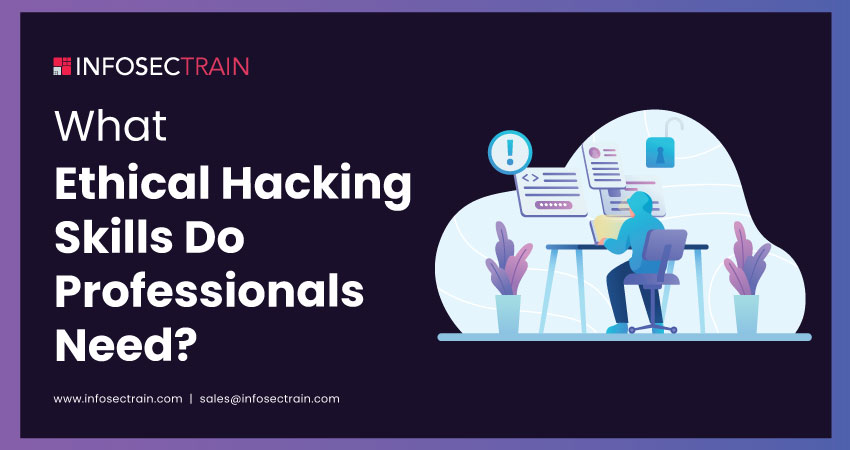What Ethical Hacking Skills Do Professionals Need?
In the constantly changing field of cybersecurity, ethical hackers play the role of unnoticed heroes. They work diligently to protect digital systems from a range of cyber threats. Leveraging their diverse skills, they proactively discover and fix vulnerabilities before malicious actors can exploit them. Ethical hackers serve as watchful guardians in the ever-shifting terrain of cybersecurity. They focus on learning and improving their skills, including technical know-how, networking, cybersecurity basics, using tools, understanding risks, being aware of social engineering, and knowing the rules. As technology advances, these skilled, ethical hackers play a crucial role in keeping organizations safe.

Defining Ethical Hackers
Cybersecurity professionals, often called “white hat” hackers or ethical hackers, actively utilize their skills to identify and reinforce security vulnerabilities in computer systems, networks, and applications. In contrast to malicious or “black hat” hackers, ethical hackers work under explicit permission from system owners. Their main objective is proactively discovering weaknesses and potential entry points that cybercriminals could exploit. Ethical hackers actively contribute to strengthening overall cybersecurity by assisting organizations in fortifying their digital defenses and safeguarding sensitive information from unauthorized access and malicious attacks.
Ethical Hacking Skills That Professionals Need
1. Strong Understanding of Networking and Security Technologies: Ethical hackers must comprehend networking and security technologies to identify and exploit vulnerabilities effectively. This involves understanding networking protocols, operating systems, security software, and encryption methods. They leverage this knowledge to navigate and assess strategies for potential weaknesses. Active mastery of these elements is crucial for ethical hackers to fulfill their role in fortifying digital defenses.
2. Ability to Work Independently and as Part of a Team: Ethical hackers should actively demonstrate their ability to work independently and collaboratively within a team. While they often work independently, they must also effectively share information and collaborate with team members to achieve shared objectives. Their capacity to balance independent work and teamwork enhances their effectiveness in addressing cybersecurity challenges. Active collaboration is essential for ethical hackers to reach common goals collectively.
3. Knowledge of Hacking Tools and Techniques: Ethical hackers use their knowledge of hacking tools and techniques to identify and exploit weaknesses. They commonly use network scanners, vulnerability scanners, and penetration testing tools. Additionally, ethical hackers must be familiar with various hacking techniques, including social engineering, phishing, and malware analysis, to comprehensively address potential security risks. Their understanding and utilization of these tools and techniques contribute to their effectiveness in securing digital environments.
4. Effective Communication Skills: Ethical hackers must communicate effectively to convey their findings to technical and non-technical audiences. They must articulate complex technical concepts easily to ensure clear and comprehensive communication of their insights. Proficiency in active communication empowers ethical hackers to connect technical intricacies with broader comprehension, facilitating informed decision-making among diverse audiences.
5. Problem-Solving and Critical Thinking Skills: Ethical hackers actively require problem-solving and critical thinking skills to navigate complex challenges and identify vulnerabilities. They must adapt to new situations and think outside the box, demonstrating innovative and strategic problem-resolution capacity. The ability to apply critical thinking actively empowers ethical hackers to effectively address dynamic cybersecurity scenarios and devise creative solutions to enhance digital security.
6. Ability to Think like a Hacker: Ethical hackers must actively cultivate the ability to think like a hacker to anticipate and identify potential cyber-attacks. This entails comprehending the motivations, methods, and vulnerabilities typically exploited by hackers. Adopting a hacker’s perspective enhances the ethical hacker’s capability to proactively assess and fortify digital defenses, staying one step ahead of potential threats.
7. Keep Learning: In the dynamic realm of ethical hacking, ongoing learning is imperative due to its constant evolution. To be updated about the most recent threats and vulnerabilities, keep up with industry publications, conferences, and online courses. This active commitment to learning ensures that ethical hackers stay well-equipped to address emerging challenges and maintain the highest standards of cybersecurity proficiency.
8. Network with Other Ethical Hackers: Network with ethical hackers to enhance your learning, discover new opportunities, and stay abreast of the latest industry trends. Building connections within the ethical hacking community fosters collaboration and provides valuable insights and perspectives, contributing to ongoing professional development in this dynamic field.
9. Gain Experience: To gain valuable experience in ethical hacking, consider starting in an entry-level position at a security firm or within the IT department of a large organization. This hands-on experience provides practical insights and exposure to real-world scenarios, laying a solid foundation for a successful career in ethical hacking. Active involvement in professional settings enhances your skills and understanding of cybersecurity practices.
10. Get Certified: Stand out in the field by obtaining professional certifications tailored for ethical hackers. Credentials like the Certified Ethical Hacker (CEH) and the Offensive Security Certified Professional (OSCP) can notably boost your qualifications and set you apart in a competitive environment. Pursuing these certifications showcases your commitment to mastering ethical hacking skills and validates your expertise in the eyes of potential employers.
CEH With InfosecTrain
InfosecTrain offers the CEH online training and certification program aligned with the latest CEH v12 version. The updated curriculum provides comprehensive training for the certification exam and extensive hands-on lab and practice range experience. This program is designed to equip individuals with the skills and knowledge needed for ethical hacking. For those looking to pursue a career in cybersecurity, InfosecTrain’s CEH v12 certification training is a valuable learning path to consider.
TRAINING CALENDAR of Upcoming Batches For CEH v13
| Start Date | End Date | Start - End Time | Batch Type | Training Mode | Batch Status | |
|---|---|---|---|---|---|---|
| 11-May-2025 | 28-Jun-2025 | 09:00 - 13:00 IST | Weekend | Online | [ Close ] | |
| 31-May-2025 | 06-Jul-2025 | 19:00 - 23:00 IST | Weekend | Online | [ Open ] | |
| 07-Jun-2025 | 13-Jul-2025 | 09:00 - 13:00 IST | Weekend | Online | [ Open ] | |
| 21-Jun-2025 | 27-Jul-2025 | 19:00 - 23:00 IST | Weekend | Online | [ Open ] | |
| 06-Jul-2025 | 16-Aug-2025 | 09:00 - 23:00 IST | Weekend | Online | [ Open ] |







 1800-843-7890 (India)
1800-843-7890 (India)